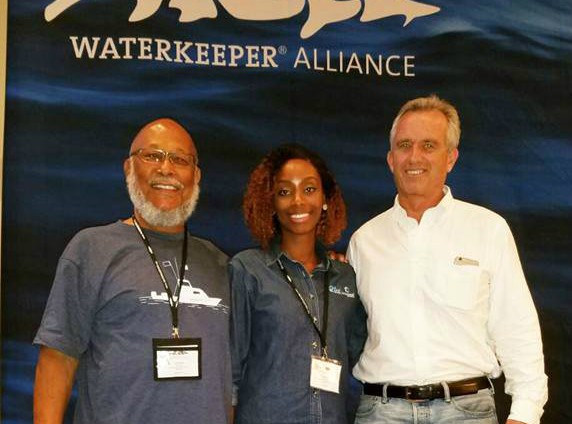
Save the Bays Chairman and Waterkeeper Bahamas President Joseph Darville (left) and Waterkeeper Bahamas Executive Director Rashema Ingraham (centre) pose with Waterkeeper Alliance president Robert F. Kennedy, Jr., at the 2016 Annual Conference in Wilmington, N.C.
|
Waterkeepers Bahamas: According to the U.S.
National Weather Service, if you live anywhere near the Atlantic Ocean,
this isn’t the best year to let your guard down while you soak up the
sun.
With a record three
named storms already on the books since the start of hurricane season on
June 1, the 2016 Atlantic hurricane season is projected to be among the
most active ever with as many as 14 named storms
and six hurricanes before the season ends
November 30. Moreover, experts predict at least two of those hurricanes could be major, reaching Category 3 or stronger on the
Saffir-Simpson Hurricane Wind Scale, suggesting "devastating damage" could occur.
With 80 percent of the
land mass in The Bahamas essentially at or slightly above sea level, the
country is even more vulnerable to devastation than most when
catastrophic storm systems rise up out of the Atlantic.
“Massive flooding from rising sea levels poses a very real threat to one of the most, if not
the most beautiful, spots on this planet,” said Save the Bays
Chairman and Bahamas Waterkeeper President Joseph Darville during a
recent presentation at the 2016 Annual Waterkeeper Alliance Conference
in Wilmington, N.C.
Headed by Robert F. Kennedy, Jr., who was reelected for another two terms as president at this year’s conference,
Waterkeeper Alliance is recognized as “the
voice of the world’s waters.” With volunteers of licensed Waterkeeper
affiliates monitoring rivers, lakes, oceans, ponds and wetlands in
dozens of countries, Waterkeeper Alliance is among
the largest and fastest growing non-profit organizations, its sole
focus on clean water. The four-day conference in North Carolina brought
together 295 waterbody stewards from every corner of the world to
discuss the effects of the global warming crisis
on their communities.
“Probably the most frightening of our
concerns over climate change is the increase of tropical storms, which
are now spawning right in our waters,” Darville said, citing the
destruction wrought in the southern Bahamas last October
by Hurricane Joaquin. “They no longer have to originate off the west
coast of Africa.”
According to Darville,
unregulated development is one of the largest contributing factors to
the accelerated rate at which the shores of The Bahamas is eroding,
further escalating the chance of cataclysmic flooding
when powerful storms strike.
“This erosion results
not only from the sea level rise, heavier storms and storm surge, but is
dramatically associated with unregulated and basically unsound major
developments,” Darville said. “Whether it’s the
absence of qualified marine engineers, or simply an ignorance of the
nature of our coastal geography, structures and walls are built without
the slightest knowledge of how winds and tides naturally flow.”
Additionally, Darville
points to developers’ insatiable desire for oceanfront golf courses as
further compounding environmental hazards created by rampant and
unrestricted development.
“They are usually
plunked right along the sea front, resulting in the run off of all the
chemicals which just glory in the destruction and death of our coral
reefs,” Darville said. “We have lost hundreds and hundreds
of acres of what used to be a scene of magnificent beauty. They also
once served as significant barriers for storms and storm surges.”
Darville’s greatest
long-term concern – an issue that could affect the ability to inhabit
The Bahamas -- is the looming loss of the country’s drinkable water.
Because the fresh water lens in The Bahamas is only
around three to four feet from the land surface, any erosion of land
increases salt water intrusion into the water tables.
“Already after major
hurricanes, we have had to wait months before the water was potable due
to the infusion of salt water,” Darville said. “As the sea level
continues to rise, and are exacerbated by major storms,
we face real danger of a nation being in a constant state of thirst.”
